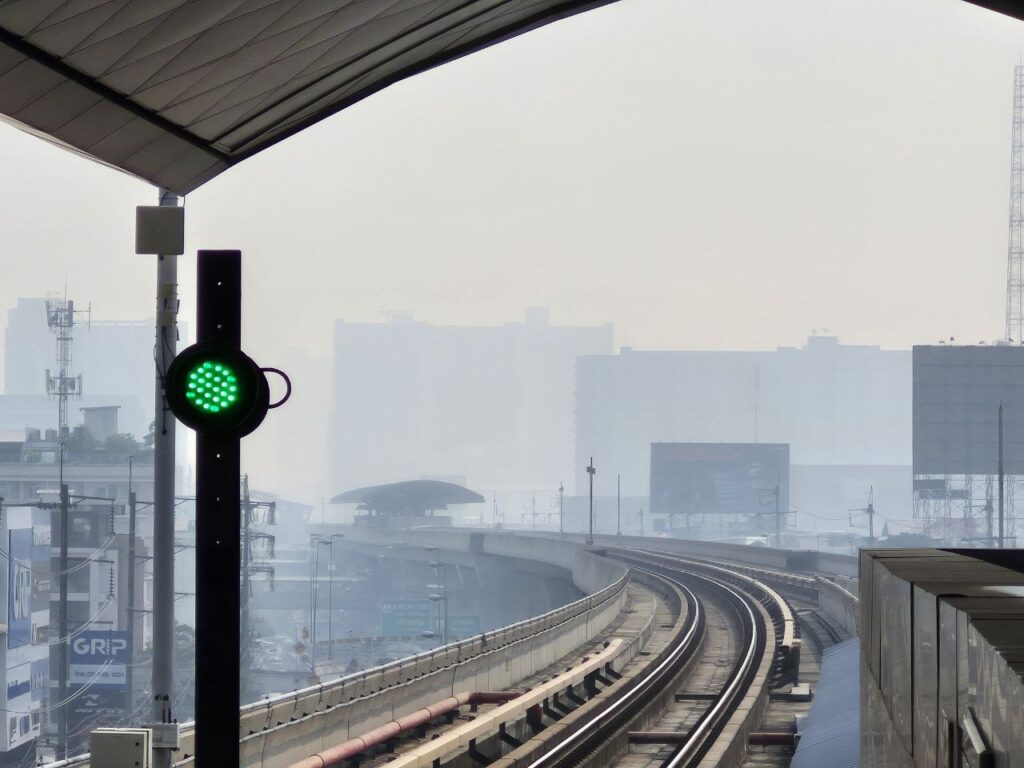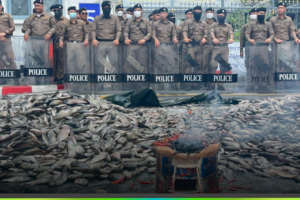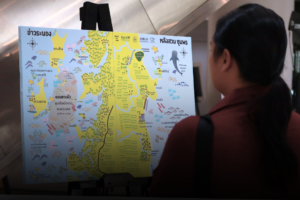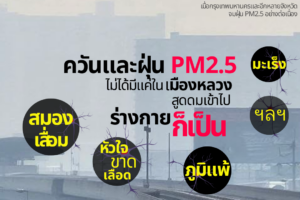Legal Opinion on
“A lack of legal legitimacy for SBPAC to rush to conclude the public consultation process
regarding the Special Economic Zone (SEZ) in Songkhla’s Chana district
during the COVID-19 Outbreak and the imposition of the Emergency Decree”
ENLAWTHAI Foundation (EnLAW)
12 May 2020
The Southern Border Province Administration Center (SBPAC) has publicly invited people to participate and share their input regarding the development of the special economic zone (SEZ) in Songkhla’s Chana district pursuant to its announcement made on 28 April 2020. It has also been announced that the public hearings will be conducted in Tambon Sakom, Talingchan and Na Thap, Chana District, Songkhla during 14-20 May 2020. Detail of the announcement can be found in SBPAC’s website (http://www.sbpac.go.th/?p=55137). The project will lead to drastic change of the current land utilization transforming the agricultural land into an industrial zone. It will inadvertently take its tremendous toll on the livelihood of local people, natural resources and the environment in Songkhla and adjacent provinces.
As an organization which promotes access to environmental rights of the people, EnLAW finds the Announcement by SBPAC, as the project developer, concerning the methods and criteria regarding the public consultation lacks legal legitimacy and is unfair to the people based on various reasons including;
- the notification methods of the Public Consultation made by the SBPAC makes it impossible for the public to be aware of the information and thereby deprives them of the right to effectively express their opinions. Also, the announcement is being made in an inappropriate time during the COVID-19 pandemic.
According to SBPAC, the Notification about the Public Consultation has been put on display since 28 April 2020 at the Headquarters of SBPAC, the Songkhla Provincial Hall, the District Office of Chana District, the Songkhla Provincial Administration Organization, the Sakom Tambon Administration Organization, Talingchan TAO, and the Tambon Na Thap Municipality Office. Such governmental offices are not always a place where people frequent. Some people will only be there when they have a particular business. Even though, they have been there, there is no guarantee that they would see the placards. In particular, since 26 March 2020 until now, in response to the COVID-19 outbreak, the State of Emergency has been declared in all vicinities throughout the Kingdom. This has led to the restriction of movement and people have been prevented from leaving their homes and contacting government offices. Even if SBPAC claims the Public Consultation Announcement has been published on its website and the website of the Public Service Center of the Office of the Permanent Secretary of the Office of the Prime Minister, in reality, it would be impractical to expect people to check out the websites or to seek any service from the websites. Many could even be unaware of the existence of such websites. In addition, the information uploaded to the websites includes a 113-page-document which makes it extremely inconvenient for people to read from their mobile devices.
It is therefore almost impossible for people who are going to affected by the project to be fully informed and have access to the information concerning the Public Consultation Announcement, which has been put up during that time. They could only be made aware of such public consultation just a few days before the public hearings are going to take place. This would not give them sufficient time to study and wrap their head around such a large-scale project in order to effectively share their opinions regarding the impending impacts of their communities and the environment.
In addition, SBPAC plans to conclude the public consultation process in all outlets within 20 May 2020, the same day the last public hearing is going to take place in Tambon Na Thap without considering that a large number of people may not have been much informed about the project prior to the public hearings. The tight schedule is being implemented despite no legal requirement for the authorities to rush to conclude the process. This simply shows how SBPAC and the state fail to place adequate importance to acquiring public opinions and the public consultation process as a whole. Such act is incompatible with the spirit of the law. It will simply become an action done in haste and serves as a rubber stamp.
- The implementation of public consultation process regarding a project with immense impact on the environment and community during the imposition of the State of Emergency and the COVID-19 outbreak is incompatible with the disease prevention measures and a violation of the right to public participation as provided for in the Constitution.
SBPAC rushes to put out a placard about the Public Consultation from 28 April-20 May 2020 and schedules to have the public hearings conducted during 14-20 May 2020 while Thailand is reeling from the COVID-19 outbreak. This appears incompatible with the incumbent measures by the government during the State of Emergency and while there are regulations to restrict freedom of movement, prohibition against meetings and seminars and a ban on public gathering. Such implementation is not only incompatible and a breach to the state’s regulations themselves, it also contravenes public rights and community rights to participate in the conservation and management of natural resources and the environment in a balanced and sustainable manner, in accordance with the Constitution of the Kingdom of Thailand 2017’s Sections 43 (2) and 57 (2), as well as the right to freedom of information, freedom of opinions and freedom of assembly.
Given the outbreak of the disease, people are prevented from fully and effectively exercising their rights and freedoms, particularly the right to express their opinions and participate in the decision making concerning a large-scale development project which may bring about widespread and adverse impact on the environment and the community. Such people who are stakeholders and are bound to be affected by the project have the right to be fully informed of all aspects of the project. They should be entitled to sufficient time to study the information and assess the impacts. They should be able to travel to meet and exchange their opinions freely. And they should be able to organize activities to disseminate the information to the public or to share their opinions with the authorities. In such case, it could be said that the people have been entitled to meaningful public participation.
- The process to put out the notifications and the determination of the criteria, methods and conditions regarding the public hearings by SBPAC is incompatible with the rights and freedoms as provided for by the Constitution, the Rule of the Office of the Prime Minister on Public Consultation by Public Hearings 2005 and has created unwarranted burden for the people.
3.1 The definition of individuals who are entitled to the right to express their opinions fails to take into account the actual gravity and boundary of the impact. It thereby deprives people who are bound to be affected of all the rights.
SBPAC specifies that people who can participate and express their opinions during the public hearings must be residents who live in the area where the project will purportedly be developed including in Tambon Sakom, Talingchan and Na Thap, Chana District, Songkhla. And in order to send in a written statement, the person must have their statement attached with a copy of document that proves their residency in the area where the project is located. SBPAC will also organize the public consultation exclusively in the three Tambons without considering the whole territory where the impact can be felt. Such act deprives the people and their community of their rights and freedoms including those who may not live in the three Tambons but could potentially be affected by the project as well. They should be entitled to the right to express their opinions regarding the project since it is a large-scale development project which may wreaked havoc natural resources and the environment, the livelihood and public health. Such impacts are multifaceted and not confined to the administrative territory of the three Tambons. The criteria and conditions appear to be incompatible with and impose restriction beyond what is provided for by the Constitution of the Kingdom of Thailand 2007’s Section 58 paragraph 1 and 2 which provide that;
“In regard to any undertaking by the State or that the State will permit any person to carry out, if such undertaking may severely affect the natural resources, environmental quality, health, sanitation, quality of life or any other essential interests of the people or community or environment, the State shall undertake to study and assess the impact on environmental quality and health of the people or community and shall arrange a public hearing of relevant stakeholders, people and communities in advance in order to take them into consideration for the implementation or granting of permission as provided by the law.
A person and community shall have the rights to receive information, explanation and reasons from a State agency prior to the implementation or granting of permission under paragraph one.”
And the Rule of the Office of the Prime Minister on Public Consultation by Public Hearings 2005’s Article 4 defines a “stakeholder” simply as “an individual who may suffer or may directly be injured by the implementation of a state project” without exclusively restricting the right to participate and to express opinions to just residents who live in the project area.
3.2 The notification put up features too little detail insufficient for a person to express their opinions. And the requirement for the people to propose solutions to the problems creates an unwarranted burden.
The information put out by SBPAC per the appendix to the Public Consultation Announcement fails to provide detail of the project, particularly regarding the impacts and the prevention and mitigation plans which fail to inform the public sufficiently to enable them to come to terms with the potential change. Such information is needed for them to analyze and assess the impacts in order that they can share their opinions and raise their concerns appropriately. By putting out such information, it is a breach to the Rule of the Office of the Prime Minister on Public Consultation by Public Hearings 2005’s Article 7 which provides that;
“The information about the state project that has to be disseminate to the public must at least include…(7) the potential impacts on local people or people who earn their living in the are designated as project site and adjacent areas and general public as well as measures for the prevention, mitigation and remediation of the damage from the impacts.…”
SBPAC does not just fail to provide sufficient information necessary for the effective public consultation, it even imposes requirements on people who want to share their opinions that they have to state the facts, the reasons and the potential solutions to the problems. Such condition has created unwarranted burden for the affected people who nay want to exercise their right to express their opinions. And on the contrary, such requirement should be imposed on the authorities and private sector who develop the project. They are supposed to listen to and explore the input and concern of the people in order to propose solutions including the prevention and mitigation measures commensurate to the problems and acceptable by the public. The implementation of a large-scale development project with adverse impact on people’s livelihood and natural resources and the environment in Songkhla and adjacent provinces warrants studies to make possible the Strategic Environmental Assessment (SEA) as required by the Constitution’s Section 58. Such assessment has to be completed after which the information can then be used to facilitate the decision making and the adoption of policies, plans and projects that reflect the finding from the SEA.
Given a lack of legal legitimacy and a lack of fairness as explained above, EnLAW urges the Southern Border Province Administration Center (SBPAC) to immediately cancel the public consultation process regarding the special economic zone (SEZ) in Songkhla’s Chana district. Such public consultation process should only be conducted when societya> returns to its normality whereby people can fully exercise their rights and freedoms. It is incumbent on SBPAC and concerned authorities to provide information and set out the terms and duration of the public hearings in a manner compatible to the people’s and community’s right to effectively participate in the decision making as provided for by the Constitution and relevant laws. 












